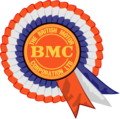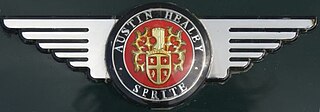
MG is a British automotive marque founded by Cecil Kimber in the 1920s, and M.G. Car Company Limited was the British sports car manufacturer that made the marque famous. Best known for its open two-seater sports cars, MG also produced saloons and coupés, with engines up to three litres in size. The marque is now owned by state-owned Chinese company SAIC Motor Corporation Limited.

Morris Motors Limited was a British privately owned motor vehicle manufacturing company formed in 1919 to take over the assets of William Morris's WRM Motors Limited and continue production of the same vehicles. By 1926 its production represented 42 per cent of British car manufacture—a remarkable expansion rate attributed to William Morris's practice of buying in major as well as minor components and assembling them in his own factory. Self-financing through his enormous profits Morris did borrow some money from the public in 1926 and later shared some of Morris Motors' ownership with the public in 1936 when the new capital was used by Morris Motors to buy many of his other privately held businesses.

The British Motor Corporation Limited (BMC) was a UK-based vehicle manufacturer, formed in early 1952 to give effect to an agreed merger of the Morris and Austin businesses.

The Austin Motor Company Limited was a British manufacturer of motor vehicles, founded in 1905 by Herbert Austin. In 1952 it was merged with Morris Motors Limited in the new holding company British Motor Corporation (BMC) Limited, keeping its separate identity. The marque Austin was used until 1987. The trademark is currently owned by the Chinese firm SAIC Motor, after being transferred from bankrupt subsidiary Nanjing Automotive which had acquired it with MG Rover Group in July 2005.

British Leyland was an automotive engineering and manufacturing conglomerate formed in the United Kingdom in 1968 as British Leyland Motor Corporation Ltd (BLMC), following the merger of Leyland Motors and British Motor Holdings. It was partly nationalised in 1975, when the UK government created a holding company called British Leyland, later renamed BL in 1978. It incorporated much of the British-owned motor vehicle industry, which in 1968 had a 40 percent share of the UK car market, with its history going back to 1895. According to companies House, the holding company “British Leyland Ltd” is still in existence, renamed “Rover Group Holdings ” and latterly “ BMW UK Holdings “.
British Motor Holdings Limited (BMH) was a British vehicle manufacturing company known until 14 December 1966 as British Motor Corporation Limited (BMC). BMH was created as a holding company following the BMC's takeover of both Jaguar Cars and the Pressed Steel Company in that year.

The Austin-Healey Sprite was a small open sports car which was produced in the United Kingdom from 1958 to 1971. The Sprite was announced to the press in Monte Carlo by the British Motor Corporation on 20 May 1958, two days after that year's Monaco Grand Prix. It was intended to be a low-cost model that "a chap could keep in his bike shed", yet be the successor to the sporting versions of the pre-war Austin Seven. The Sprite was designed by the Donald Healey Motor Company, with production being undertaken at the MG factory at Abingdon. It first went on sale at a price of £669, using a tuned version of the Austin A-Series engine and as many other components from existing cars as possible to keep costs down.

Leyland Motors Limited was a British vehicle manufacturer of lorries, buses and trolleybuses. The company diversified into car manufacturing with its acquisitions of Triumph and Rover in 1960 and 1967, respectively. It gave its name to the British Leyland Motor Corporation, formed when it merged with British Motor Holdings in 1968, to become British Leyland after being nationalised. British Leyland later changed its name to simply BL, then in 1986 to Rover Group.

Longbridge plant is an industrial complex in Longbridge, Birmingham, England, currently leased by SAIC as a research and development facility for its MG Motor subsidiary. Vehicle assembly most recently stopped in 2016.

The New Zealand Motor Corporation was the New Zealand representative, importer, distributor and retailer of a number of the best-known British automobiles including Rolls-Royce. It carried out the same functions for a wide range of manufacturers of industrial machinery and equipment. It inherited and operated four independent plants assembling CKD kits of British Leyland and, from the late 1970s, Honda models. It was succeeded piecemeal by Honda New Zealand in the 1980s.

The BMC B series was a line of straight-4 & straight-6 internal combustion engine mostly used in motor cars, created by British automotive manufacturer Austin Motor Company.

The MGB is a two-door sports car manufactured and marketed from 1962 until 1980 by the British Motor Corporation (BMC), later the Austin-Morris division of British Leyland, as a four-cylinder, soft-top sports car. It was announced and its details first published on 19 September 1962. Variants include the MGB GT three-door 2+2 coupé (1965–1980), the six-cylinder sports car and coupé MGC (1967–69), and the eight-cylinder 2+2 coupé, the MGB GT V8 (1973–76).

Nuffield Organization was the unincorporated umbrella-name or promotional name used for the charitable and commercial interests of owner and donor, William Morris, 1st Viscount Nuffield. The name was assumed following Nuffield's gift made to form his Nuffield Foundation in 1943, it linked his business interests to his existing very generous philanthropy. The same enterprises had previously been referred to as the Morris Organizations and at first described itself as The Nuffield Organization, A Cornerstone of Britain's Industrial Structure.

The Leyland Atlantean is a predominantly double-decker bus chassis manufactured by Leyland Motors between 1958 and 1986. Only 17 Atlantean chassis were bodied as single deck from new.

Pressed Steel Company Limited was a British car body manufacturing business founded at Cowley near Oxford in 1926 as a joint venture between William Morris, Budd Corporation of Philadelphia USA, which held the controlling interest, and a British / American bank J. Henry Schroder & Co. At that time the company was named The Pressed Steel Company of Great Britain Limited. It acquired Budd's patent rights and processes for use in the United Kingdom. Morris transferred his interest to his company, Morris Motors Limited.

The Daimler Fleetline is a rear-engined double-decker bus chassis which was built between 1960 and 1983.
British Motor Corporation (Australia) was a motor manufacturing company formed in Australia in 1954 by the merger of the Austin Motor Company (Australia) and Nuffield (Australia) Pty Ltd. This followed the merger in 1952 of the Austin Motor Company and the Nuffield Group in the United Kingdom to form the British Motor Corporation. Following further corporate changes in the UK in the late 1960s, BMC Australia was absorbed into the newly established British Leyland Motor Corporation of Australia, the name of which became Leyland Motor Corporation of Australia in 1972, and then JRA Limited in March 1983.

Plant Oxford located in Cowley, southeast Oxford, England, is a BMW car assembly facility where Mini cars are built. The plant forms the Mini production triangle along with Plant Hams Hall where engines are manufactured and Plant Swindon where body pressings and sub-assemblies are built.

Pressed Metal Corporation South Australia (PMCSA) was an Australian bus bodybuilder based in Royal Park, Adelaide.

Denning Manufacturing is an Australian bus manufacturer in Acacia Ridge, Brisbane, Australia. In September 2019, it was acquired by Custom Bus, but its branding and operations will be retained.



















